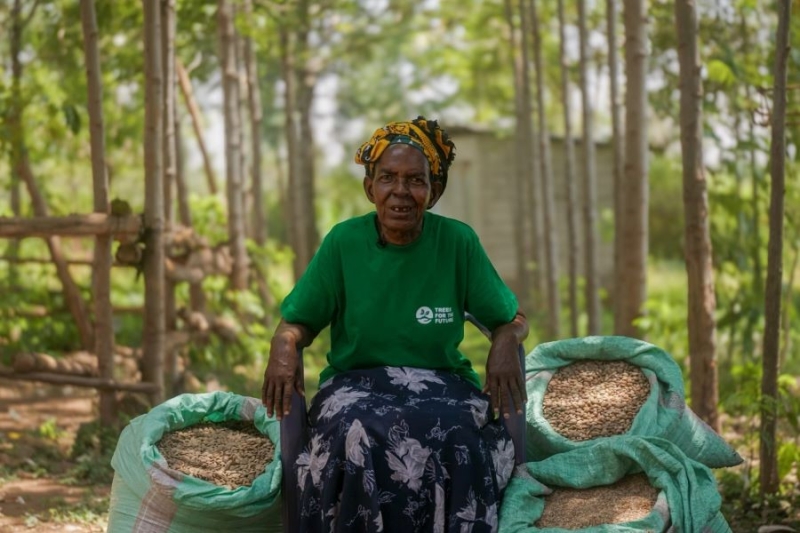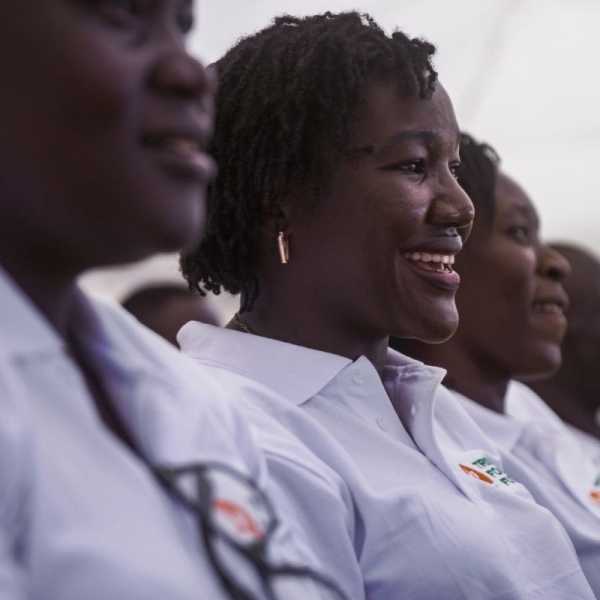(Image Credit: Catona Climate)
23 Sep 2024 — Catona Climate and Trees for the Future (TREES) reveal that 1,300 farmers have graduated from its UN-recognized Forest Garden Program in Homa Bay, Kenya, Africa. The program is part of an agroforestry project meant to remove atmospheric carbon dioxide by increasing tree biomass and enhancing soil carbon.
The graduation comes after four years of intense training in sustainable agroforestry practices, forest garden planning and design and techniques such as composting, grafting, crop rotation, cover cropping and integrated pest management. The training also included farmer-to-farmer learning and cooperative initiatives among the trainees and farm cohorts.
“These 1,300 graduates are proof that sustainable agriculture is not only possible but a pathway to prosperity,” says Mercy Karunditu, director of field programs for TREES. “Their hard work and dedication, supported by the partnership with Catona Climate, have brought tangible improvements to their lives and their land.”
“First of its kind” agroforestry project
According to TREES, the graduation is also the result of the “first of its kind” Lake Victoria Watershed Agroforestry Project in Homa Bay. The project includes partnerships with over 15,000 local, smallholder farmers to develop forest gardens — “a multi-tiered agroforestry systems of trees, shrubs and crops.”
The program empowers farmers to enhance food security and nutrition by sustainably accessing nutritious produce, boosting income through higher crop yields and investing in their families and communities. The graduation celebration celebrated the latest cohort’s achievements, which were attended by their families, government officials and community leaders.
“I joined with my family when the land was not productive, leading to low harvest,” explains Dorothy Onyango, a participant farmer. “I have noticed changes in the soil through production since I joined.”
“This is because I have been trained well on making and using compost, and now I have realized an increase in fertility and moisture of my soils as well as better production yield.”
Onyango also notes that the experience has brought about unexpected streams of income.

Graduate and Year Four Lead Farmer, Dorothy Onyango (Image Credit: Catona Climate).
“In my Forest Garden, I love the trees the most because of the seed production and supply I am currently doing, which I sell,” she reveals. “I have managed to pay school fees for two of my grandchildren.”
Rolling back deforestation impacts
TREES highlights that the Forest Garden Program helps farmers combat deforestation and land degradation by merging sustainable farming methods with entrepreneurial skills. The initiative has increased food security and income for participants and fostered more resilient and biodiverse farms.
A pioneering bioacoustic study conducted across 70 Forest Garden sites detected over 100 species, including the endangered gray crowned crane, supporting the theory that transitioning to agroforestry enhances biodiversity levels.
“By adopting agroforestry techniques, these farmers are creating more resilient landscapes, securing their livelihoods and contributing to the global climate solution,” says Tate Mill, CEO of Catona Climate. “Their accomplishments inspire hope, not only for their communities but for the future of our planet.”
Future agroforestry plans
Consisting of 1,303 farmers — 62% women and 25% young farmers — the cohort restored 568 hectares and planted over 4.7 million trees. Their efforts are expected to benefit around 8,920 community members, either directly or indirectly.
The graduating cohort states they are prepared to expand their success. These include selling excess crops, seeds and initiating entrepreneurial ventures, thereby boosting their local community’s economic growth.
TREES says it aims to expand its Forest Garden Program, targeting the restoration of 229,000 hectares and creating 230,000 green jobs by 2030. Together with Catona Climate, it also plans to extend the carbon project throughout Kenya and beyond.

